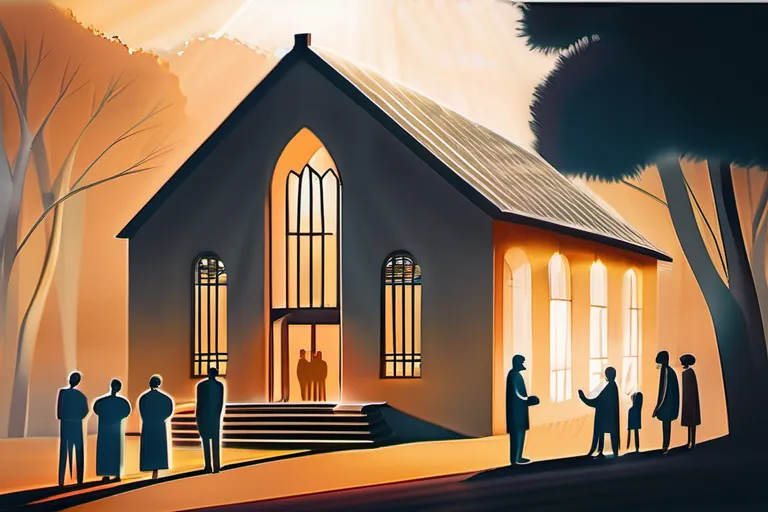Explore the history, beliefs, practices, and unique aspects of the Quaker religion.
The Quaker religion, also known as the Religious Society of Friends, is a Christian denomination that originated in the 17th century. This article provides an in-depth look at the history, beliefs, practices, and unique aspects of this fascinating faith.
The Origins of the Quaker Religion
The origins of Quaker religion are deeply intertwined with the life and experiences of George Fox, who lived from 1624 to 1691. Imagine a time when religious institutions were rigid and unyielding, leaving many searching for a more personal connection with God. How did it come to be that George Fox, a common man with no formal education, would challenge the established order and found what would become the Quaker religion?
George Fox faced profound spiritual crises in his early life. He questioned the prevailing religious doctrines of his time, seeking truth beyond the church walls. His journey was marked by a series of transformative experiences that led him to believe he had direct access to God’s Inner Light. Could it be that this light guided him to a path that would change not just his life but also countless others?
The Quaker religion, or the Religious Society of Friends, was born out of these convictions. Fox traveled widely, preaching against formalism and encouraging people to listen directly to God. He emphasized simplicity and equality, arguing that all humans could be inspired by this Inner Light, regardless of their social status. His message resonated with many who felt alienated by the Church of England’s traditional practices.
The rise of Quakerism was both a challenge and a testament to the power of individual spiritual experience over institutional control. George Fox’s vision led him from persecution to leadership, turning what could have been a small sect into a movement that emphasized direct personal experiences with God. His journey is not just about founding a religion but also about the power of individual belief and the quest for truth in a world often dominated by conformity.
Quaker Beliefs: The Inner Light and Peace Testimony
Imagine peeling back the layers of history to uncover the core beliefs of the Quaker religion, much like unveiling a precious gemstone. At its heart lies the concept of ‘Inner Light,’ which is central to Quaker belief and practice. This idea suggests that every person possesses a divine spark or light, enabling them to connect with God directly. It’s as if each individual has a unique compass, guiding their spiritual journey without the need for traditional religious intermediaries.
But what exactly does it mean to have this inner light? Could it be that this belief is not just about personal enlightenment but also about communal discernment? How do Quakers utilize this concept in their meetings for worship, where silence and reflection reign supreme? It’s like a silent symphony, each person contributing to the harmony without speaking, trusting in the collective wisdom of their shared spirit.
The commitment to peace among Quakers is another profound aspect of their faith. Their Peace Testimony is not just a passive stance but an active choice to work towards justice and equality. How do they manifest this commitment? Through pacifism, social activism, and nonviolent communication, Quakers strive to create a world where love prevails over conflict. It’s as if they walk the path of peace by choosing every step carefully, ensuring that their actions reflect their deeply held values.
Understanding these beliefs is not just about intellectual curiosity; it’s about grasping the essence of what it means to live a life in harmony with one’s inner light and the world around them. How can we apply these principles to our own lives? Could embracing the Inner Light lead us to more profound spiritual experiences, or might it inspire us to act courageously for peace and justice?
Quaker Practices: Meetings for Worship and Silent Prayer
Imagine stepping into a Quaker meeting for worship. The room feels like a quiet sanctuary, almost as if time has paused. What you see might challenge your expectations; there are no hymnals or sermons, just people sitting in silence. This practice is central to Quakerism and reflects their belief in the Inner Light, which they interpret as the direct guidance of God within each individual. How do these meetings work?
During a meeting for worship, anyone may rise to speak if moved by the Spirit. However, most of the time, it is a silence that fills the space. This silent waiting can be profound and transformative. It’s not a lack of interest but an openness to hearing what might emerge from within. Just like tuning into a radio station on static, Quakers listen for divine whispers in this quiet setting.
Silent prayer, often referred to as ‘inner silence,’ is another key practice. Unlike traditional prayers that ask for specific things, inner silence focuses on listening and reflecting. It’s about being present with oneself and the world around you, free from distractions. This practice encourages a deep connection with the divine and with one’s own thoughts and feelings.
These practices are deeply intertwined. Meetings for worship provide a structured space to experience sacred silence, while silent prayer allows individuals to connect with their inner selves in quiet moments throughout the day. Together, they create a continuous dialogue between the individual Quaker and God, emphasizing that religious experience is not confined to set times or places.
Reflecting on these practices, it becomes clear why Quakers value simplicity and directness in worship. They believe that everyone has access to divine truth, making each person’s voice valuable within their community. This openness and egalitarian approach reflect the core beliefs of Quakerism, where every individual is seen as a unique reflection of the divine.
The Role of Women in Quakerism
Imagine a world where gender roles are as fluid and open to interpretation as the Quaker belief that all people have direct access to God’s inner light. In this religion, women have not only played significant but also leading roles throughout its history, challenging traditional norms and contributing immensely to the faith.
From early Quaker meetings where women spoke freely, often in opposition to men’s positions, to their active involvement in social reform movements like abolition and suffrage, women have been pivotal. They’ve not just participated; they’ve driven the narrative of what it means to be a true disciple. How did this come about?
The Quaker commitment to equality in all aspects of life, including leadership roles, is rooted deeply in their belief that everyone has equal worth and direct access to God. This idea challenged the patriarchal structures prevalent during the 17th century when women’s voices were largely silenced. Why should some be heard while others remained unheard?
Women like Margaret Fell, a prominent Quaker leader in the late 17th century, not only encouraged but also actively participated in public ministry and writing. Their efforts laid the groundwork for future generations of women to take on more significant roles within the religion.
In modern times, while much progress has been made, the struggle for full equality persists. Quaker meetings continue to grapple with how best to support and empower women leaders. Questions arise: How can we ensure that every voice is heard in our worship spaces? What new challenges do contemporary women face as they navigate their roles within Quakerism?
As we look forward, the role of women in Quakerism remains an evolving narrative. It’s a story of courage, resilience, and unyielding pursuit of justice, reflecting the broader values of the faith. How can each one of us contribute to this ongoing journey towards true equality?
The contributions of women in Quakerism are not just historical anecdotes but living testimonies that shape the very essence of what it means to be a Quaker today. They remind us that true leadership and activism come from acknowledging and valuing every individual’s unique voice.
Quakers and Social Justice: Peace Activism and Equality
How many times have we heard that ‘actions speak louder than words’? For Quakers, this couldn’t be more true when it comes to their commitment to social justice and peace activism. Throughout history, they have been at the forefront of advocating for equality, often putting their beliefs into practice through active involvement in various causes.
Imagine a group of people who not only believe in peace but also live by it—Quakers are that group. Their journey towards peace began in the 17th century when George Fox, inspired by visions and prophecies, started to speak against the injustices of his time. He advocated for simplicity, integrity, and nonviolence, laying the foundation for what would become a powerful movement.
One of the most striking aspects of Quaker activism is their consistent push for equality. They have long been at the heart of movements advocating for civil rights, women’s suffrage, and ending slavery. In fact, many early abolitionists were Quakers, driven by their belief in inherent worth and dignity for all individuals.
Consider this: if you’re looking for a religion that truly translates its values into action, you might find inspiration in the lives of Quakers. They not only preach peace but live it through nonviolent direct action and community service. From organizing anti-war protests to supporting marginalized communities, their efforts have had a profound impact.
Today, Quaker organizations continue this legacy by engaging in contemporary issues such as environmental stewardship, economic justice, and human rights. The Testimonies, a set of core beliefs that guide Quaker behavior, serve as a blueprint for ethical living and social activism. These testimonies include integrity, peace, simplicity, community, equality, and stewardship.
So, how do we measure the success of such a commitment to justice? Perhaps by the lasting impact of their work on society—a world where every person is valued and treated with respect. Quakers remind us that change starts from within and can ripple outward through collective action and dedication.
As we look towards the future, it’s clear that Quakerism offers a unique perspective on social justice and peace. Their history teaches us valuable lessons about how to integrate our beliefs into everyday life, making the world a better place one step at a time. Could you imagine what could be achieved if more of us embraced such principles?
Join them in this noble quest for a more just and peaceful world, or simply learn from their example. The path forward is clear: it’s about living your beliefs through action, making a difference in the lives of others, and creating a better future for all.
The Future of Quakerism: Challenges and Opportunities
As we delve into the future of Quakerism, one cannot help but ponder: what challenges lie ahead for this faith community that has long been known for its unique beliefs and practices? The world today is a complex web of issues—climate change, economic inequality, technological advancements, and social unrest. How can Quakers navigate these challenges while staying true to their core values?
One significant challenge is the decline in membership. As Quakerism faces dwindling numbers in some areas, it raises questions about its relevance in today’s world. Can this faith adapt and evolve without losing its essential identity? Another challenge is the need for greater outreach and understanding. How can Quakers engage with communities that may not understand their quiet yet powerful approach to spirituality?
However, amidst these challenges, there are also opportunities for growth and renewal. The digital age provides a platform for Quakerism to reach more people through online meetings and social media. This can be seen as a chance to redefine the traditional notions of worship and community building.
The future also holds possibilities for Quakers to deepen their impact in social justice movements. With issues like environmental sustainability becoming increasingly urgent, Quakers can take a lead role in advocating for sustainable practices and policies that benefit both humanity and the planet. Their long history of peace activism can be refocused towards addressing modern conflicts and global tensions.
In this journey forward, Quakers must remain open to change while holding steadfast to their principles. They need to find ways to connect with younger generations who seek meaning in a fast-paced world. By embracing these challenges and seizing opportunities, Quakerism can continue to be a beacon of hope and peace for all.
Will Quakers rise to the occasion? The path ahead is filled with both obstacles and potential. Only time will tell how they navigate this future, but one thing is certain: their legacy of peace, equality, and spiritual simplicity continues to inspire us all.
Conclusion
 Quakers continue to make significant contributions to society through their emphasis on peace, simplicity, and equality. By understanding their religion, we can appreciate their impact and learn from their values.
Quakers continue to make significant contributions to society through their emphasis on peace, simplicity, and equality. By understanding their religion, we can appreciate their impact and learn from their values.











